Old Testament
Genesis Exodus Leviticus Numbers Deuteronomy Joshua Judges Ruth 1 Samuel 2 Samuel 1 Kings 2 Kings 1 Chronicles 2 Chronicles Ezra Nehemiah Esther Job Psalms Proverbs Ecclesiastes Song of Solomon Isaiah Jeremiah Lamentations Ezekiel Daniel Hosea Joel Amos Obadiah Jonah Micah Nahum Habakkuk Zephaniah Haggai Zechariah MalachiHabakkuk 2:4 Similar Verses
Habakkuk 2:4 Cross References
Behold, his soul which is lifted up is not upright in him: but the just shall live by his faith.
Uncover the Rich Themes and Topics of This Bible Verse
Listed below are the Bible themes associated with Habakkuk 2:4. We invite you to explore each theme to gain deeper insights into the Scriptures.
Habakkuk 2:4 Cross Reference Verses
This section features a detailed cross-reference designed to enrich your understanding of the Scriptures. Below, you will find carefully selected verses that echo the themes and teachings related to Habakkuk 2:4 KJV. Click on any image to explore detailed analyses of related Bible verses and uncover deeper theological insights.
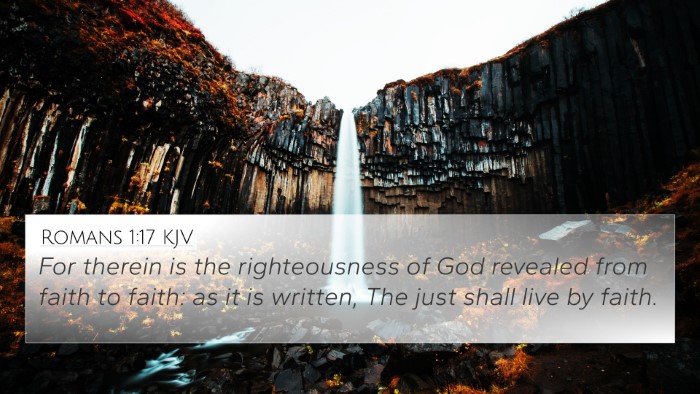
Romans 1:17 (KJV) »
For therein is the righteousness of God revealed from faith to faith: as it is written, The just shall live by faith.

Hebrews 10:38 (KJV) »
Now the just shall live by faith: but if any man draw back, my soul shall have no pleasure in him.
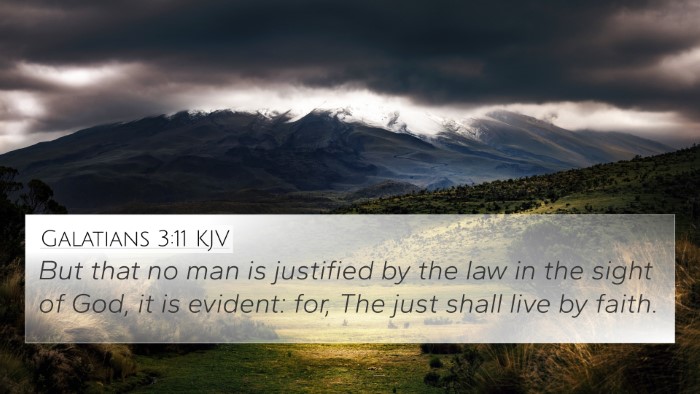
Galatians 3:11 (KJV) »
But that no man is justified by the law in the sight of God, it is evident: for, The just shall live by faith.
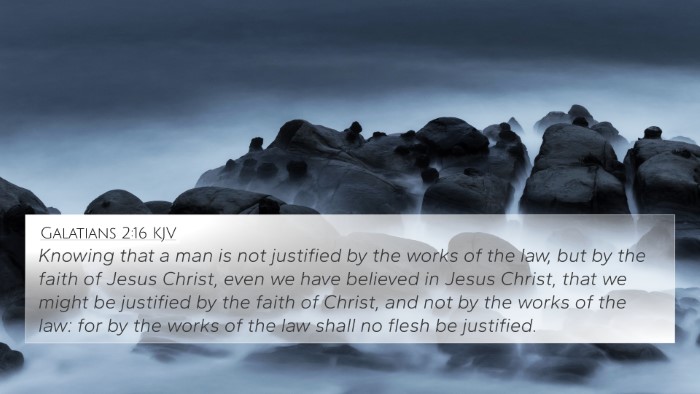
Galatians 2:16 (KJV) »
Knowing that a man is not justified by the works of the law, but by the faith of Jesus Christ, even we have believed in Jesus Christ, that we might be justified by the faith of Christ, and not by the works of the law: for by the works of the law shall no flesh be justified.
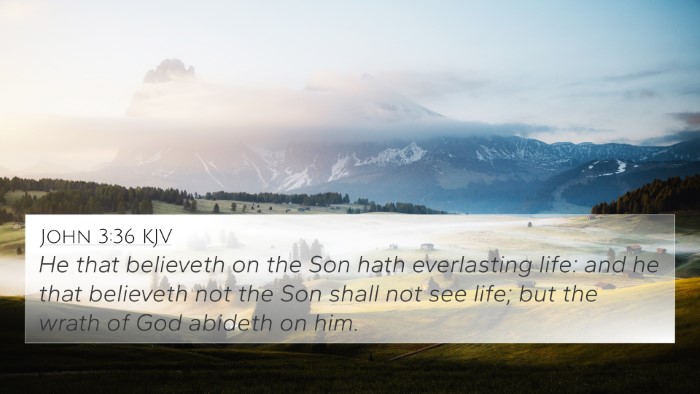
John 3:36 (KJV) »
He that believeth on the Son hath everlasting life: and he that believeth not the Son shall not see life; but the wrath of God abideth on him.
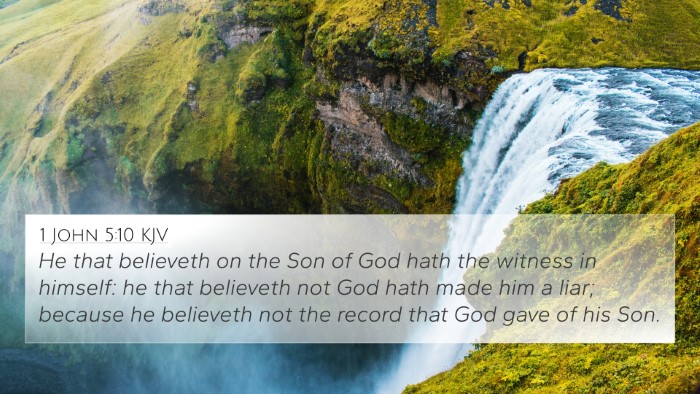
1 John 5:10 (KJV) »
He that believeth on the Son of God hath the witness in himself: he that believeth not God hath made him a liar; because he believeth not the record that God gave of his Son.
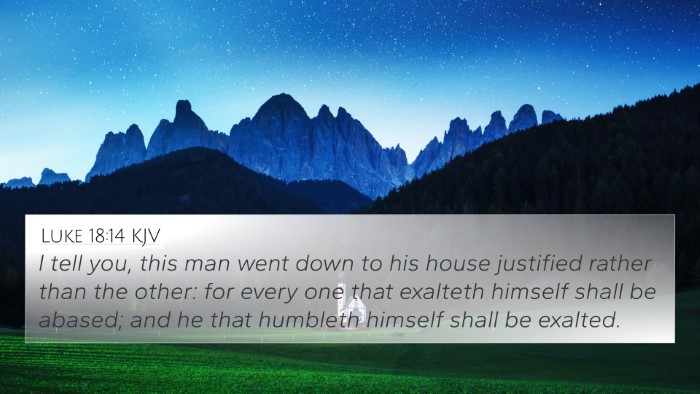
Luke 18:14 (KJV) »
I tell you, this man went down to his house justified rather than the other: for every one that exalteth himself shall be abased; and he that humbleth himself shall be exalted.

Daniel 5:20 (KJV) »
But when his heart was lifted up, and his mind hardened in pride, he was deposed from his kingly throne, and they took his glory from him:
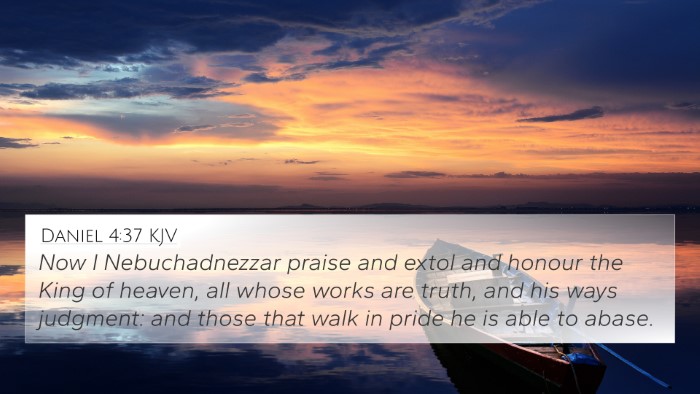
Daniel 4:37 (KJV) »
Now I Nebuchadnezzar praise and extol and honour the King of heaven, all whose works are truth, and his ways judgment: and those that walk in pride he is able to abase.

1 Peter 5:5 (KJV) »
Likewise, ye younger, submit yourselves unto the elder. Yea, all of you be subject one to another, and be clothed with humility: for God resisteth the proud, and giveth grace to the humble.

Daniel 4:30 (KJV) »
The king spake, and said, Is not this great Babylon, that I have built for the house of the kingdom by the might of my power, and for the honour of my majesty?
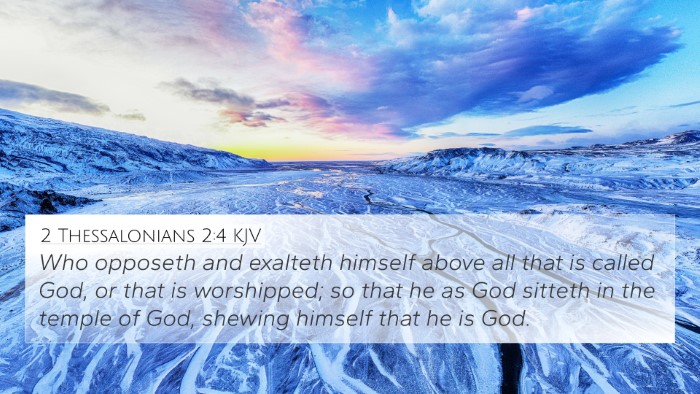
2 Thessalonians 2:4 (KJV) »
Who opposeth and exalteth himself above all that is called God, or that is worshipped; so that he as God sitteth in the temple of God, shewing himself that he is God.
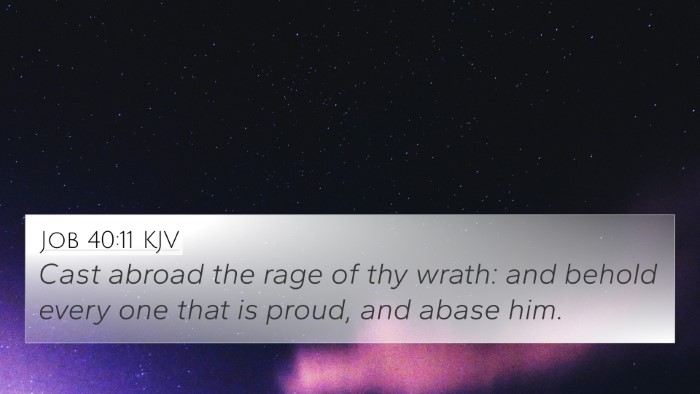
Job 40:11 (KJV) »
Cast abroad the rage of thy wrath: and behold every one that is proud, and abase him.
Habakkuk 2:4 Verse Analysis and Similar Verses
Understanding Habakkuk 2:4
Habakkuk 2:4 states, "Behold, his soul which is lifted up is not upright in him: but the just shall live by his faith." This verse encapsulates a profound truth about the nature of faith and righteousness before God. Below is a comprehensive analysis based on insights from esteemed public domain commentaries, focusing on the meaning, implications, and connections of this verse within the broader biblical narrative.
Verse Meaning and Context
The context of Habakkuk 2:4 reflects the struggle of the prophet as he grapples with God’s justice amidst the suffering of His people. In this verse, the contrast is drawn between the proud and the righteous. The proud, represented by the Chaldeans (Babylonians), trust in their own power and arrogance. Conversely, the righteous live by faith, depending on God’s promise and character.
Matthew Henry notes that the “soul which is lifted up” signifies pride and self-reliance, while the “just” refers to those justified by faith. This radical dependence on faith suggests a deeper, spiritual existence that transcends temporal struggles.
Key Insights from Commentaries
-
Matthew Henry:
Henry emphasizes that “faith is the great principle of a believer's life.” He highlights how true faith manifests in a life marked by trust in God's promises rather than relying on self-crafted strength.
-
Albert Barnes:
Barnes explains that the verse articulates the justification of believers through faith. He also remarks on the nature of faith as active and continual, exhibiting how the righteous persevere through trials by relying on God.
-
Adam Clarke:
Clarke provides cultural insights into the significance of faith in the context of ancient Israel and its application to both the Jew and Gentile. He underlines that faith entails more than mere belief—it requires action and a commitment to God's will.
Cross-References and Thematic Connections
Habakkuk 2:4 resonates with various biblical texts, creating an inter-biblical dialogue that enriches our understanding of faith and righteousness. Here are some critical cross-referenced verses:
- Romans 1:17: "For therein is the righteousness of God revealed from faith to faith: as it is written, The just shall live by faith." This connects the prophet’s declaration to Paul’s teaching on salvation through faith.
- Galatians 3:11: "But that no man is justified by the law in the sight of God, it is evident: for, The just shall live by faith." Paul uses this to demonstrate the basis of Christian standing before God.
- Hebrews 10:38: "Now the just shall live by faith: but if any man draw back, my soul shall have no pleasure in him." The author encourages perseverance in faith, reflecting Habakkuk’s themes of faithful living.
- 2 Corinthians 5:7: "For we walk by faith, not by sight." This verse expands on the idea of living through faith rather than the circumstances we face.
- James 2:24: "Ye see then how that by works a man is justified, and not by faith only." This provides a complementary perspective on how faith manifests through action.
- Philippians 3:9: "And be found in him, not having mine own righteousness, which is of the law, but that which is through the faith of Christ." This illustrates the shift from self-righteousness to faith in Christ.
- 1 Peter 1:5: "Who are kept by the power of God through faith unto salvation ready to be revealed in the last time." This highlights the protective nature of faith over the believer’s life.
Thematic Bible Verse Connections
Habakkuk 2:4 exemplifies major biblical themes such as faith, righteousness, and divine justice. By examining these connections, deeper insights can be gleaned about the nature of God’s relationship with humanity:
- The Justification by Faith: This theme connects Habakkuk to the teachings of Paul, emphasizing that believing in God's provision leads to justification (Romans 5:1).
- The Nature of True Righteousness: The righteousness that God accepts is rooted not in personal merit but in faith (Philippians 3:9).
- Living by Faith: The concept that life must be guided by faith informs not only personal belief systems but also communal practices among believers.
Faith in Practice: Linking Bible Scriptures
The application of Habakkuk 2:4 encourages believers to actively demonstrate their faith through their daily lives. It fosters a community where faith is lived out in tangible acts of love and justice, drawing connections between scriptures that reinforce this principle. The cross-referencing of biblical texts provides tools for deeper understanding and personal application:
- Tools for Bible cross-referencing allow believers to explore the interconnectedness of Scripture and develop a more robust theological understanding.
- A Bible concordance can facilitate the search for themes related to faith, guiding readers in their study of interconnected verses.
- Cross-reference Bible study methods encourage groups to engage with Scripture collectively, elucidating how verses support and illuminate each other.
Concluding Thoughts
In conclusion, Habakkuk 2:4 serves as a cornerstone for understanding the dynamics of faith in the life of the believer. Through comparative Bible verse analysis and cross-referencing biblical texts, we gain a richer, more nuanced perspective of God's promises and our response. The just do indeed live by faith, which is not only a declaration but a call to live in trust, hope, and action, remaining steadfast amid life's uncertainties.


